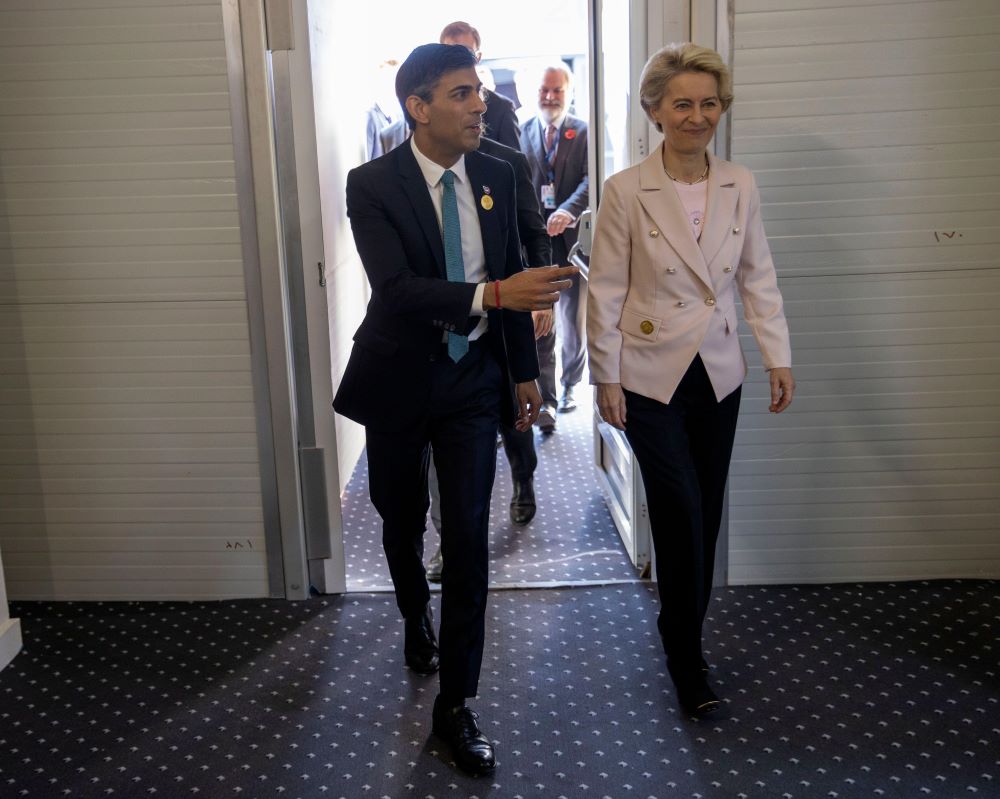New Brexit Checks Risk Meat And Cheese Prices Soaring Even Higher
The food and drink sector is bracing for a Brexit shock later this year (Alamy)
5 min read
Post-Brexit import checks due to be introduced this autumn are predicted to cause "a shock in the system" with the price of meat and dairy seeing another spike on top of recent inflation.
Prime Minister Rishi Sunak has made halving inflation which reached a record high of 11.1 per cent last October one of his five core missions, a promise some economists are increasingly doubtful he can keep. In recent weeks he has come under growing pressure to get a grip of food inflation specifically - which has remained stubbornly high and is a key driver of strain on household finances.
Overall inflation measured by the Consumer Price Index was measured at 8.7 per cent in April, a drop from 10.1 per cent in March, but the contraction is largely driven by the decrease in energy costs, while food prices remain high. Food inflation appeared to slow slightly in May, with the British Retail Consortium (BRC) on Tuesday putting the rate at 15.4 per cent, down from 15.7 per cent, and the government is considering how to reduce it by a much larger portion amid the ongoing cost-of-living pressures.
Industry figures blame soaring prices primarily on Covid, Russia's invasion of Ukraine and the UK's exit from the European Union. But they expect the impact of Brexit to exacerbate the situation even further when the government finally introduces checks on EU imports later this year, putting strain on food supply chains, which could see prices rise even more.
Meat and dairy products are expected to the most acutely affected, as they will be treated as posing the greatest health risk to the UK under the government's revised border regime and therefore be subject to the most stringent checks. Cheese and pork have already seen some of the biggest inflation price rises. According to the most recent ONS figures, the price of hard cheese increased by 41 per cent, Cheddar by 39 per cent and soft cheese by 31 per cent in the year leading up to April 2023. The price of pork chops rose by 30 per cent while bacon and pork sausages increased by 25 and 20 per cent.
Shane Brennan, Chief Executive of the Cold Chain Federation, said the introduction of the first phase of checks on 31 October will trigger "a shock in the system", making meat and dairy products like cheese “slower to reach shelves, more expensive and less accessible”.
“If the products are considered by the government to be medium risk, then they will be significantly more expensive to ship and trade than they were before 31 October," Brennan told PoliticsHome.
"We'll be on a downward inflationary curve by the time we reach October, but things will still be more expensive than they otherwise would have been.”
Under the Border Target Operating Model, food imports like vegetables and cereals are set to be treated as low risk, meaning they will attract few or no controls. Ministers already delayed the introduction of post-Brexit import checks on four occasions since the country left the bloc in January 2020, owing to the risk of disruption to items reaching supermarket shelves.
As it prepares to finally implement checks, the government says the fact this revised border model uses more digital methods than previous versions means getting food into the country will be less burdensome for EU sellers and UK businesses at the other end. The first checks will be rolled out in late October, with further phases on 31 January and 31 October 2024.
While industry figures welcome the shift towards digitisation, Brennan says the added paperwork still poses a threat not just through extra costs, which in turn could drive price rises, but also through delays in products reaching supermarket shelves, while smaller European producers may decide to ditch the UK market altogether due to the new barriers.
"We're not talking about all imports, but we're talking about some important foods and they'll face paralysis and crisis in terms of supply in the weeks following 31 October," he continued. "The shelves won’t be empty, but there will be a decline in choice and variety."

While the UK is largely self-sufficient when it comes to dairy products, it has been highly reliant on European businesses when it comes to items like cheese. Around 60 per cent of cheese consumed in the UK comes from the continent, like Brie from France and Feta from Greece. The UK also imports large quantities of beef and pork from the continent.
There is also frustration within the industry with what leading figures describe as a lack of clarity from the government when it comes to specific details about how the new border model will work.
One food industry figure said meetings with government officials had been "a bit tense" in recent weeks amid complaints that businesses were not getting the information they needed to prepare.
Some parts of the food sector, however, say introducing the checks, while costly, is necessary as it will bring an end to the 'un-level playing field' which has emerged since Brexit whereby EU businesses have enjoyed frictionless access to the UK market, while their British counterparts have navigated complex and costly export rules since day one of life outside the bloc.
Unlike the UK, which has repeatedly delayed the introduction of import checks since the divorce, Brussels enforced the panoply of paperwork with immediate effect, which was followed a sharp fall in UK exports to the continent.
There have also been repeated warnings that failing to carry out post-Brexit checks on EU products increase the risk of diseases like African swine fever entering the UK.
